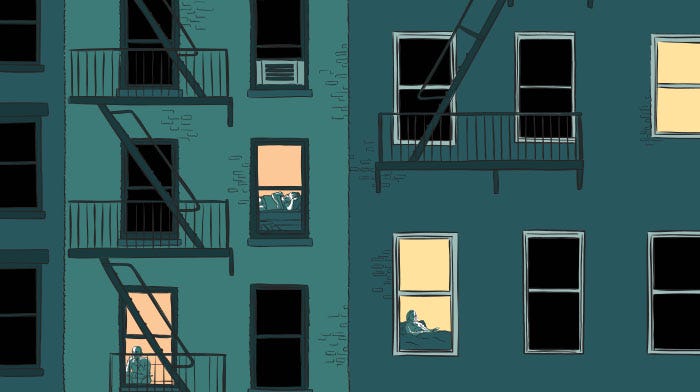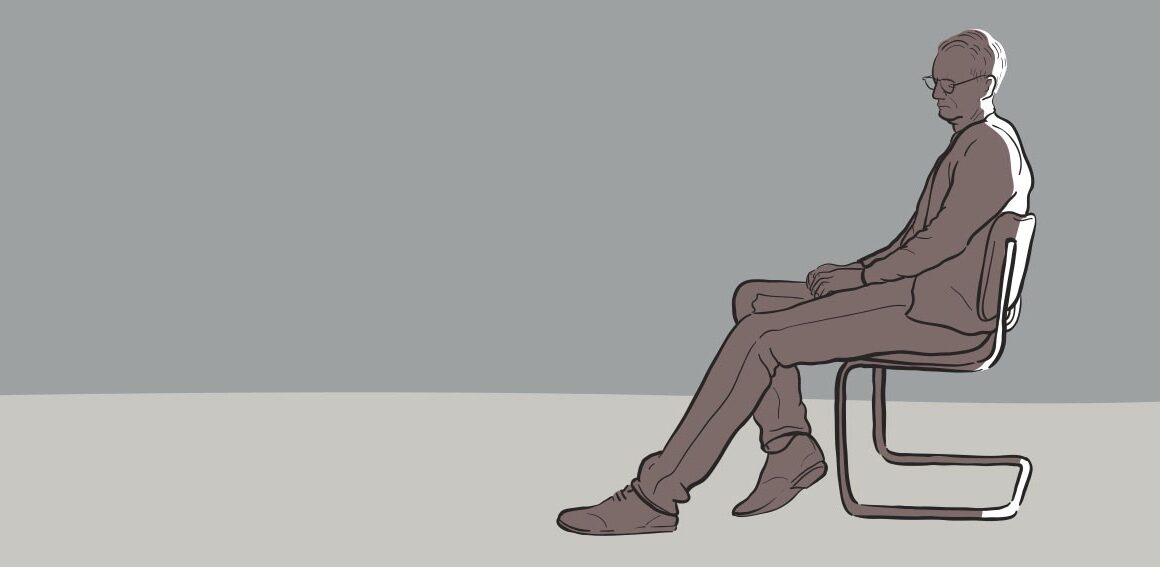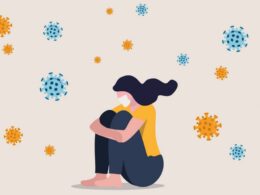CHCF — California Health Care Foundation
By Avram Goldstein
AUGUST 2, 2021
An illustration from Kristen Radtke’s new graphic nonfiction book, Seek You: A Journey Through American Loneliness.
In this extraordinary era of pandemic isolation, social distancing, and masking, it makes perfect sense that loneliness and its impact on mental and physical health would garner literary attention.
Vivek Murthy, MD, MBA, the US surgeon general, released a book early in the pandemic saying America is experiencing a loneliness epidemic.
Murthy reported that chronic loneliness works this way:
- Persistent stress increases inflammation that damages tissues and blood vessels, increasing risk of cardiovascular illness and death.
- It can interfere with the function of the immune system and make high blood pressure, obesity, and other conditions more likely, Murthy said.
In her new graphic nonfiction book Seek You: A Journey Through American Loneliness, artist-writer Kristen Radtke takes a qualitative look at the emotional dimensions of this daunting subject.
Her illustrations, musings, and reminiscences explore “the space between the relationships you have and the relationships you want.” She ponders the roots of the peculiarly American form of social isolation.
“Loneliness is often exacerbated by a perception that one is lonely while everyone else is connected,” Radtke wrote.
“It’s exaggerated by a sensation of being outside something that others seem to be in on: a family, a couple, a friendship, a joke. Perhaps now we can learn how flawed that kind of thinking is, because loneliness is one of the most universal things any person can feel.”
While loneliness is not a medical or psychological diagnosis, it is strongly associated with behavioral health, physical maladies, and increased suicide rates.
The data on the connection between loneliness and human health are robust, according to the American Psychological Association.
When COVID-19 erupted in 2020, quarantines, social distancing, and stay-at-home orders exacerbated the baseline level of loneliness.
Through the pandemic in the US, the sense of isolation has fluctuated, rising last summer and again in June 2021 even as the economy improved and restrictions were eased, Reed Abelson reported in the New York Times.
Newly released data from a recent federal telephone survey of 11,000 Medicare enrollees show
- 40% reported feeling less socially connected to family and friends (PDF) than they were last November,
- 28% more stressed or anxious, and
- 22% more lonely or sad.
Social Isolation
Chronic loneliness is associated with increased rates of anxiety, depression, and suicide, according to the US Centers for Disease Control and Prevention (CDC).
“Loneliness among heart failure patients was associated with a
- nearly 4 times increased risk of death,
- 68% increased risk of hospitalization, and
- 57% increased risk of emergency department visits,” according to the CDC.
- At the same time, about one in four Americans (25%) over 65 are socially isolated, a condition that significantly raises a person’s risk of premature death, rivaling smoking, obesity, and physical inactivity, according to Social Isolation and Loneliness in Older Adults, a 2020 report from the National Academies of Sciences, Engineering, and Medicine.
- Social isolation is associated with a 50% increased likelihood of a person developing dementia.
- The absence of meaningful social relationships is associated with a 29% higher risk of heart disease and 32% higher risk of stroke.

- For seniors, many of whom live alone or are coping with hearing or vision loss that further isolates them, the challenge may be even more pronounced for those living in rural areas.
In 2018, Capitol Public Radio health care reporter Sammy Caiola reported on high suicide rates for seniors in Amador County.
She interviewed volunteers who navigate Amador’s twisting highways to find isolated people and keep them company.
“ There are many little roads in Amador County that have a lonely person at the end of them,” one volunteer told Caiola.
- Lonely older adults are nearly twice as likely as seniors not experiencing loneliness to use painkillers and sedatives, which frequently leads to substance use problems, accidents, medical complications, falls, or death, according to a new UCSF study in JAMA Internal Medicine.
Geriatrician Ashwin Kotwal, MD, who was first author on the study, urges community physicians to connect lonely elders to senior centers, exercise classes, grief groups, or volunteer programs rather than reflexively prescribing opioids and other drugs.
Loneliness and isolation are on the rise for young people as well.
- During the COVID-19 era, students have spent long periods in isolation, away from school and friends.
In a CHCF-supported survey released in March by Common Sense Media and Hopelab, nearly 38% of teens and young adults reported symptoms of moderate to severe depression, up from 25% just two years earlier.
- In a 2020 study in the Journal of American Academy of Child and Adolescent Psychiatry, researchers reported that children and teens are more likely to experience depression and anxiety during isolation and after it ends.
For many Americans who have been socially isolated, life won’t return to normal soon because of the pandemic’s cumulative effects, researchers told Abelson. “Recovery from the pandemic may take a long time and could affect people’s view of their relationships over time,” Abelson wrote.
The Ministers of Loneliness
Murthy argues that policymakers must confront the loneliness challenge to avert countless individual disasters. “Even though our circumstances have changed dramatically, our nervous system is still very similar to what it was thousands of years ago,” he told Roge Karma of Vox.
“When we are separated from other people, we enter that stress phase as a signal for us to seek out connections.
And if not attended to, it can cause damage in the same way that hunger or thirst can if they are not attended to.”
Policymakers in other countries are starting to respond to the loneliness problem.
- In Japan, where suicide among women has been on the rise during the pandemic, the nation’s prime minister in February created a cabinet post to alleviate social isolation, Shogo Kodama reported in Tokyo-based financial news outlet Nikkei Asia.
“Telework and the lack of social gatherings during Japan’s fight against the coronavirus have left people feeling increasingly stressed and lonely,” Kodama wrote.
The new minister, Tetsushi Sakamoto, planned to put together an interagency team and meet with advocacy groups and others to identify top priorities and solutions.
- A 2017 report in the UK (PDF) issued by the Jo Cox Commission on Loneliness reported that more than nine million people feel lonely much or all of the time.
The finding prompted then prime minister Theresa May to create a government position, the minister for loneliness, according to New York Times correspondent Ceylan Yeginsu. Baroness Diana Barran holds the job and is focusing on using social media to disseminate information about local resources to combat isolation, as well as funding community-based organizations tackling the issue.
- Young people, people with disabilities and chronic health conditions, caregivers, people who have lost a loved one, and new mothers are especially susceptible, she said.
Help for Californians
The California Department of Health Care Services operates CalHOPE, a hub for social and emotional resources like a “ warm line” that connects callers to people who have lived experience with stress, anxiety, depression, and other impacts of the pandemic and life in general.
These peer counselors provide nonjudgmental support and guide people to community resources that can help them cope with emotional issues and stay connected to others.
Although set up as a response to the pandemic, the service is intended to remain after the COVID-19 emergency.
Warm Line counselors are able to connect people to many culturally sensitive services provided through CalHOPE. The Warm Line is at 833–317-HOPE (4673) and www.calhope.org.
About the author

Avram Goldstein is a senior engagement officer at CHCF, where he is the editor of The CHCF Blog.
Originally published at https://www.chcf.org on August 2, 2021.












